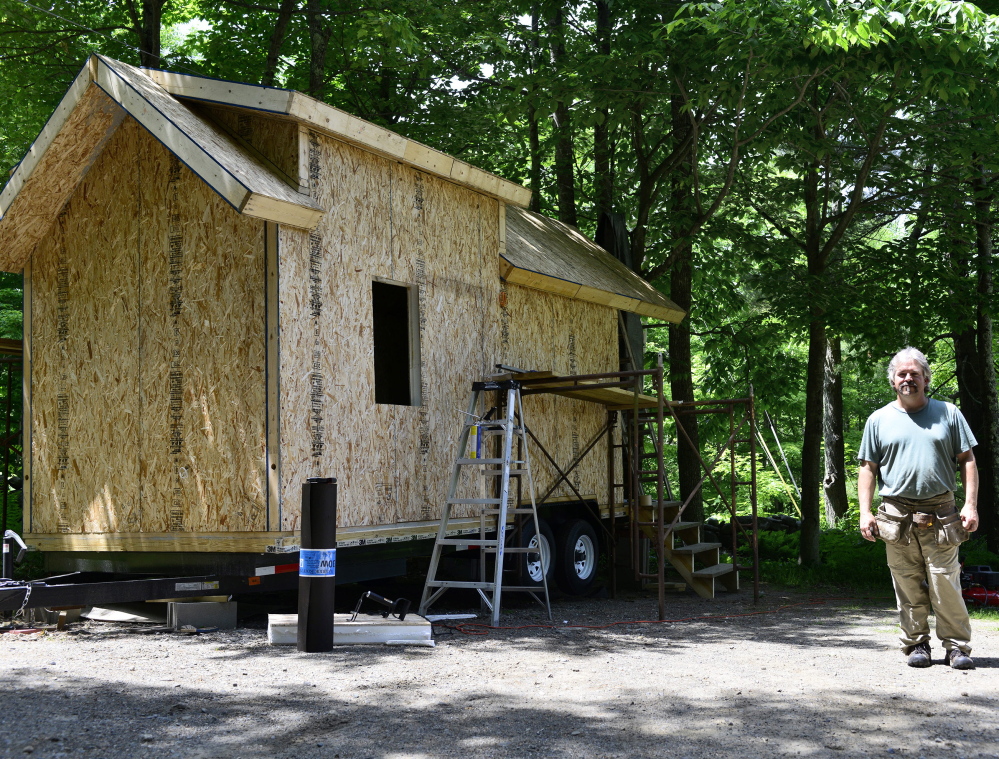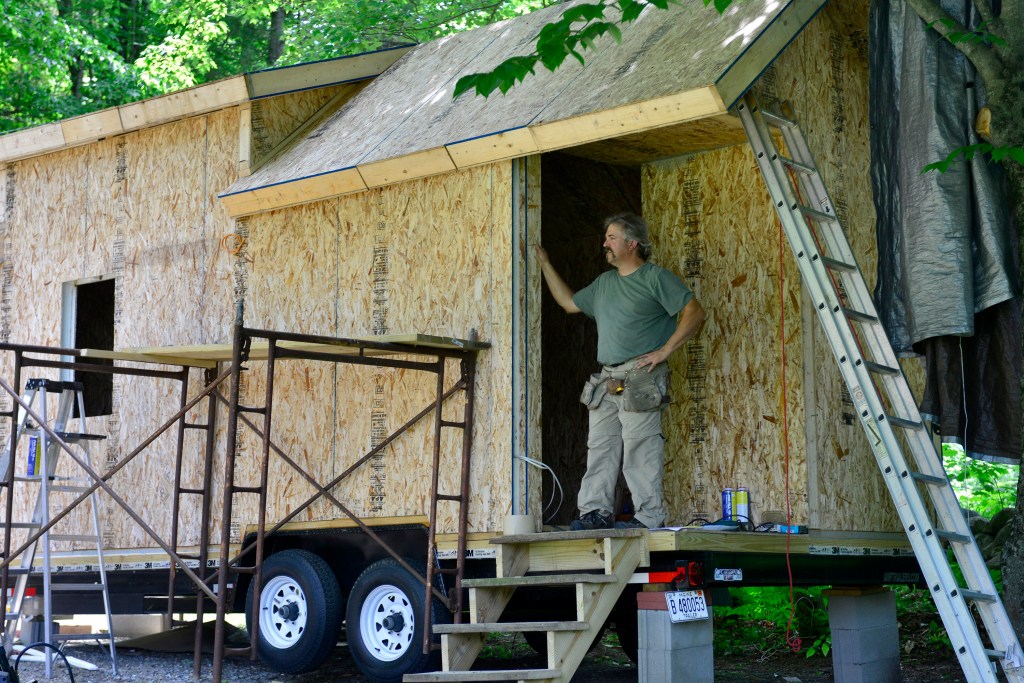On a sunny Tuesday morning, Alan Plummer decided it was time to cut out the first window in his 195-square-foot home.
“I’ve always really been a minimalist at heart,” said Plummer, 48, as he worked on the home that stands, for now, in his mother’s driveway in Manchester. The home is so small that passers-by could assume he’s building a shed.
“I always thought, ‘Gee, I really only need this,’ so why would I want something more than that?” Plummer said. “Why would I want a big fancy car? Why would I want any of that extra stuff?”
Plummer, who has three adult children, is one of a growing number of people who are looking to live simpler lifestyles after growing dissatisfied with chasing the “American Dream.”
He left his job as a software training coordinator, put his home in Augusta up for sale and sold or donated most of his possessions. He started working as a baker, organized food drives for the needy and began building his tiny home, using mostly local materials.
“In the back of my head I always wanted to get a better job, get better pay,” Plummer said. “Until I really started thinking, ‘Why do I want to do that? What difference does that make?’ ”
Plummer was inspired by the concept of tiny houses, a growing social movement in which people downsize their living space to make room and free up funds for experiences, rather than things. While the average new single-family home in the United States is 2,598 square feet, according to a 2013 U.S. Census report, the typical tiny house ranges from about 100 to 400 square feet.
“I went to a few more places, did a few more things and bought my kids a few more gadgets,” Plummer said of the days when he worked a 9-to-5 job. “But it didn’t make me happier to do all that, it didn’t make me happier to have more money.”
Elizabeth Dunn, an associate professor of psychology at the University of British Columbia who studies consumerism and happiness, said in a New York Times article last year that “people still view housing as a central component of happiness and a critical aspect of the American dream, but there is little research to support that.”
Dunn wrote, “what matters for our happiness is what we do in the minutes and hours of our day.”
Joshua Millburn and Ryan Nicodemus, who call themselves The Minimalists, would agree.
After leaving corporate jobs, they gave up most of their possessions, downsized their apartments and started a blog promoting a lifestyle that they say “helps people really question the things that they have in their lives.”
“(Minimalism) makes room for the things that are really important,” Nicodemus said. “To find out what is adding value and what is bringing joy.”
Last week, The Minimalists stopped in Portland on a 100-city tour promoting their second book, “Everything that Remains.” About 70 people, ranging in age from 3 to 80, crammed into Longfellow Books to hear Millburn and Nicodemus speak.
While it seems like an exclusive concept, Nicodemus said the principles of minimalism can “help everyone no matter where they fall on the socioeconomic scale.”
“There’s all these different flavors of minimalism,” Millburn said. “So it’s going to look different for the 20-year-old guy traveling all over the world than it is for the family of eight living in a city.”
Most in the audience were curious about living more simply. Plummer was among a few who have applied the concept in their daily lives.
With a tiny house and fewer bills, Plummer said, “You could do whatever you want,” like travel the world, pay off debt or start a tiny house community in rural Maine, as Plummer plans to do.
“I knew what (minimalism) all meant,” Plummer said. “That’s not the name that I would give myself, but I am a minimalist by nature.”
While the idea of minimalism takes various forms, each proponent has a catalyst that prompts the lifestyle switch. For Plummer, it was his daughter, who told him about the tiny house movement a few years ago.
For Shirl McIntire, 73, of Eliot, it was her spiritual group, a worldwide movement called Intenders’ Circles.
“The group encourages us to let go of what we don’t need and focus on what we do need,” she said.
McIntire compared the Intenders’ Circles to prayer groups, in which people come together to talk about what they’re grateful for and how they would like to live. McIntire has adopted those principles in her everyday life by shedding and donating her possessions as she prepares to sell her home and move from Maine to Florida.
“I’ve made a lot of changes in my life and now I know what works and what doesn’t,” McIntire said. “It helps me focus on the positive.”
For Nate Damm, a 26-year-old Winthrop resident, the desire to give up everything was prompted by the urge to walk across the U.S. from Delaware to California.
“My bills weren’t super high, but I felt like I was spending a lot of time working to pay for things I didn’t want or need,” he said. “I wanted more freedom to do what I loved.”
Damm put his dream on hold for a few years while he finished school, worked and built up his savings account.
“I always wanted to travel and see the world,” he said. “The idea (to walk across the country) wouldn’t let me go until I did it.”
So in 2011, when Damm was 22, he gave up his apartment, sold his car and donated everything he owned that couldn’t fit in his backpack.
“It took a lot of adjusting and was pretty grating, physically,” he said of his six-month trek, which covered more than 3,400 miles. “But I learned that I love simplicity and spending more time doing the things I like – writing, traveling and hanging out with friends and family.”
Since then Damm, who has written a book about his adventures, “Life on Foot: A Walk Across America,” said he has traveled “aggressively,” and is staying in Maine just for the summer.
“Eventually, I’d like to settle down in Maine,” Damm said. “But for now I have some more traveling.”
Send questions/comments to the editors.




Success. Please wait for the page to reload. If the page does not reload within 5 seconds, please refresh the page.
Enter your email and password to access comments.
Hi, to comment on stories you must . This profile is in addition to your subscription and website login.
Already have a commenting profile? .
Invalid username/password.
Please check your email to confirm and complete your registration.
Only subscribers are eligible to post comments. Please subscribe or login first for digital access. Here’s why.
Use the form below to reset your password. When you've submitted your account email, we will send an email with a reset code.